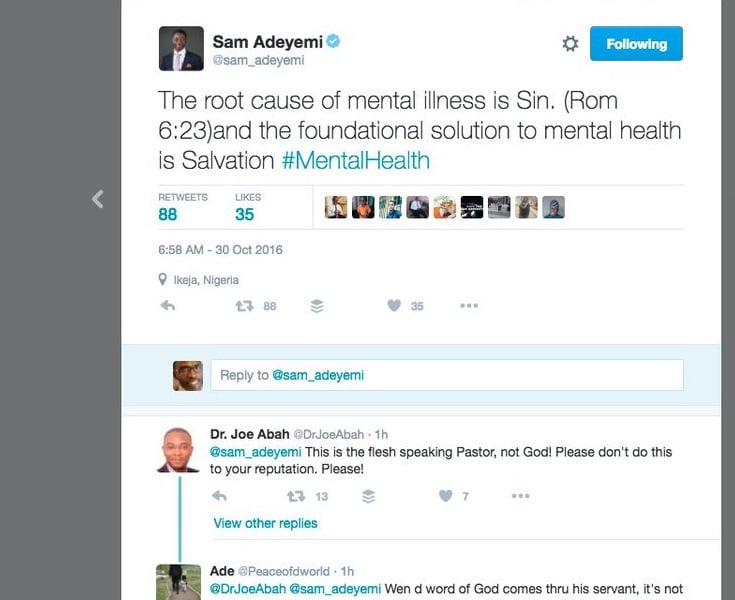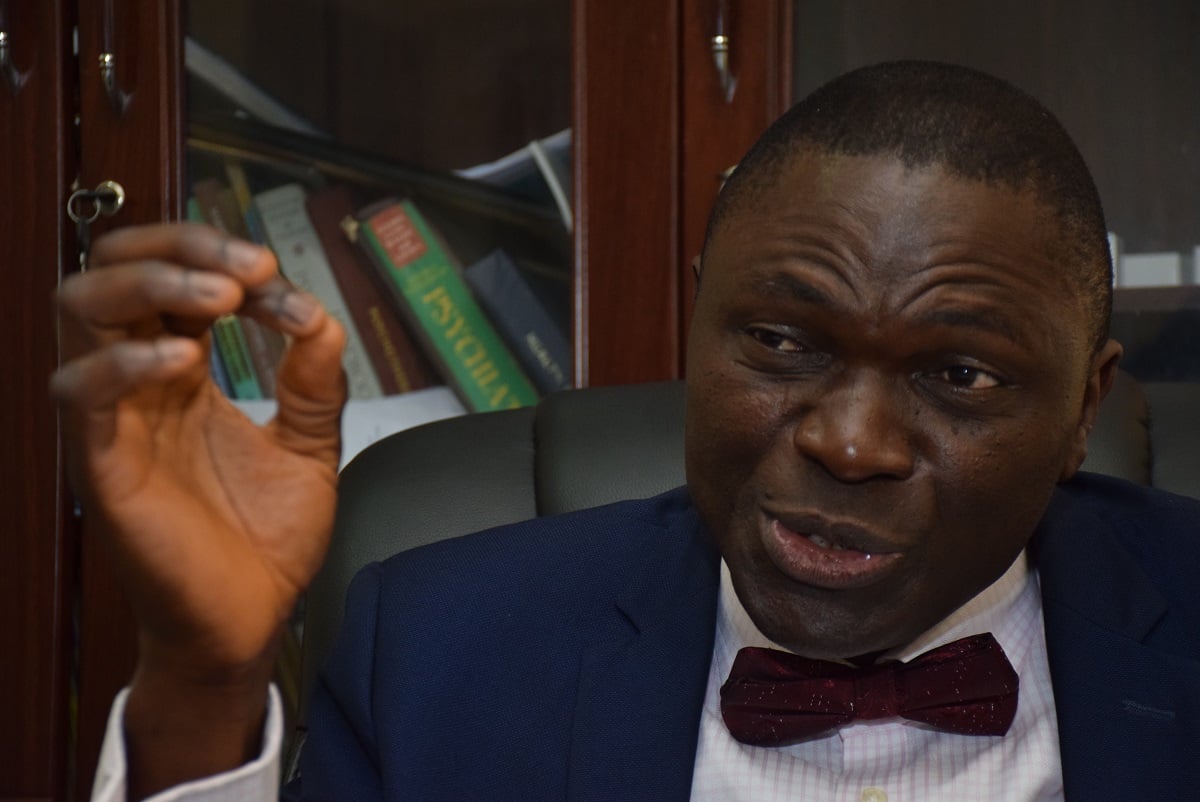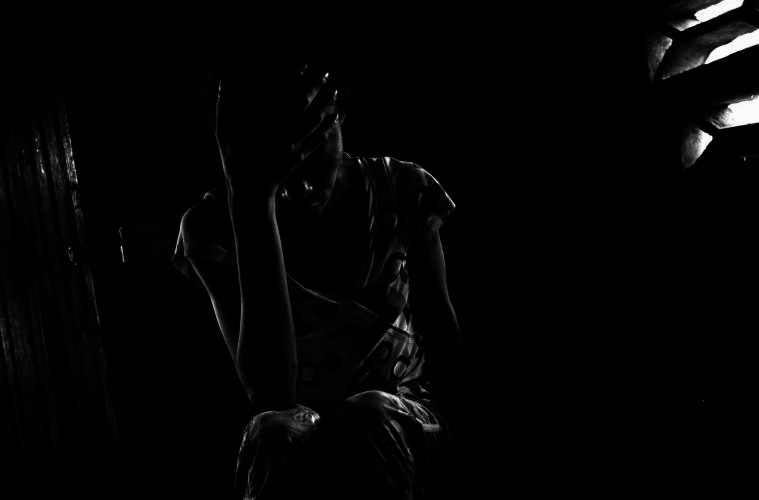In May 2016, Sam Adeyemi, senior pastor of Daystar Christian Centre, was delivering a series of Twitter lecture on sins. One of the tweets read, “sin is the root cause of mental illnesses and the foundational solution to mental illness is salvation”.
Twitter went agog with two major divides – people defending his stance and people opposing his stance; fearing that the pastor’s views on mental health will perpetuate an already existing false myth that mental illness is spiritual.

If you allow Satan and your circumstances to define who you are it will distort the balance in your mental state. #MentalHealth
— Sam Adeyemi (@sam_adeyemi) October 30, 2016
Advertisement
Adeyemi’s understanding of mental illnesses in Nigeria is the dominant one, not a new narrative and certainly not exclusive to him.
For instance, Maria Chijindu (not real name as she wants to remain anonymous) tells this reporter of her experience as a person living with Bipolar Affective Disorder (BAD). She says her symptoms started manifesting in 2004 – erratic mood swings including long bouts of extreme sadness and periods of excessive excitement or anxiety.
Advertisement
Once she was hallucinating, with an overwhelming belief that she was worthless and then her speech slurred – a symptom now defined as mood congruent psychosis.
Maria says this worried Maria’s family, immediate and extended, so much that her paternal aunt residing at her home state, asked her parents to send her down so she could be healed by God – “the ultimate physician”.
Maria’s mum, held down by a strict patriarchal family culture, incontestably took her down to her aunt. The aunt took mother and child to a church in Owerri, Imo state; and without physical or psychological tests, Maria was diagnosed by a pastor as being an Ogbanje (water goddess)- who was being disturbed by water spirits.
“That was laughable even to my 18-year-old self,” Maria says. “I didn’t even know how to swim, I didn’t even understand what it meant to be a water goddess… but they kept telling me to confess…to confess my sins.
Advertisement
“My mum knew I should not be there, but my aunt was an almighty in-law, who could not be disobeyed, especially when, frankly, no one knew what was going on with me.
“So, I started to walk away. The church members dragged me back, tore my clothes, pummelled me and all the while, telling my mum that it was the spirits preventing me from an exorcism exercise.”
Maria’s symptoms are typical bipolar affective disorder symptoms, one of the various mental disorders resulting from a poor mental health.
According to WHO, “Mental health is a state of well-being in which an individual realises his or her own abilities, can cope with the normal stresses of life, can work productively and is able to make a contribution to his or her community.”
Advertisement
The various mental disorders include depression, bipolar affective disorder, schizophrenia and other psychoses, dementia, intellectual disabilities and developmental disorders including autism.”

Advertisement
Bipolar, which Maria was eventually diagnosed with in a hospital and by a neuro-psychiatrist, consists of both manic and depressive episodes.
According to WHO, “Manic episodes involve elevated or irritable mood, over-activity, pressure of speech, inflated self-esteem and a decreased need for sleep,”
Advertisement
And even though it is a chronic illness, there are effective treatments available for acute phase of bipolar disorder and the prevention of relapse in the form of mood stabilizers.
Maria spoke about the many ways “healing” was sought for her mental illness after she was diagnosed.
Advertisement
Her parents made sure she went to her neuro-psychiatrists, but they also brought in a myriad of pastors to pray away whatever sin caused her illness. Her parents, she says, described her symptoms as “strange and “unusual” in her family.
The pastors had numerous spiritual explanations for her erratic moods, but none were able to “heal” her until, according to Maria, she started taking her drugs.
The pastors, Maria says, often asked her to pray to God for forgiveness and healing. “I prayed fervently with the pastors who constantly assured me of “healing” if I prayed earnestly,” she says.
But stability for Maria only happened when she started taking her medications regularly.
“It definitely wasn’t all the anointing oil poured on my head by my parent’s pastors. I know it is the drugs that keep me stable. I have no doubt about it because of the relapses I experience when I am off them,” she says.
Prevalence of spiritualisation of mental illness in Nigeria

Olugbenga Owoeye, director and head of clinical service, Federal Neuro-Psychiatric Hospital, Yaba, Lagos, tells this reporter that mental illnesses are often spiritualised in Nigeria.
“Some people believe that mental illness are caused by a spirit. They believe that the devil inflicts mental illness on people and that mentally ill people are dangerous,” Owoeye says.
“There are people who claim that mentally ill people have offended certain gods.”

But these are all myths and have no truth to them, Owoeye says. He says the narrative that mental illness being a sin or a spiritual issue fuels stigma where mentally people refused to seek help for fear of being labelled sinners or demons.
Maria’s story collaborates the doctor’s stance. “I remember my aunt’s pastors telling me I would die if the exorcism wasn’t carried out. They said I had a water spirit husband who was responsible for what I now know are symptoms of Bipolar Affective Disorder”.
Research: Ogechi Ekeanyanwu, Yemisi Akinbobola
Funded by Code for Africa’s impactAfrica programme
Editors note: This picture was used for illustrative purpose
Add a comment






